The Optical Films Market is estimated to be valued at USD 23.3 billion in 2025 and is projected to reach USD 42.5 billion by 2035, registering a compound annual growth rate (CAGR) of 6.2% over the forecast period.
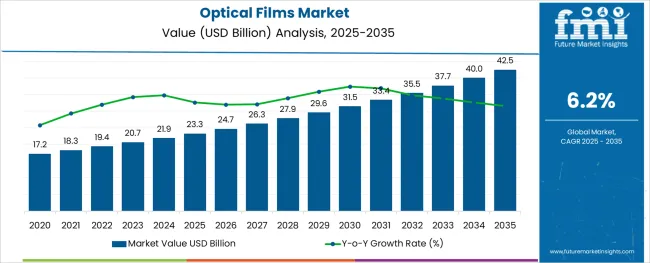
The optical films market is witnessing consistent growth as display technology becomes increasingly advanced and consumer electronics demand continues to rise. Strong momentum is being observed in the adoption of high-performance display materials across smartphones, televisions, and wearable devices.
Industry players are focusing on lightweight, energy-efficient films that can support miniaturization, higher resolution, and flexible panel applications. Technological innovation in surface treatment, multilayer coatings, and high transparency polymers has strengthened product differentiation.
Furthermore, regulatory focus on sustainable electronics and growing demand for recyclable display components are influencing material choices and production investments. As digitalization expands and OLED, LCD, and micro LED technologies continue to evolve, the demand for function-specific optical films is expected to remain robust across both consumer and industrial applications.
The market is segmented by Type, Function, and Application and region. By Type, the market is divided into PET Protection & Release Film, Surface Treatment Film, PVA Film & Protection, Reflector Film, and Light Guide Plate. In terms of Function, the market is classified into Brightness Enhancement Films, Display Surface Films, and Light Control/Privacy Films.
Based on Application, the market is segmented into Smartphones, TV, Laptops, Tablets, and Billboards. Regionally, the market is classified into North America, Latin America, Western Europe, Eastern Europe, Balkan & Baltic Countries, Russia & Belarus, Central Asia, East Asia, South Asia & Pacific, and the Middle East & Africa.
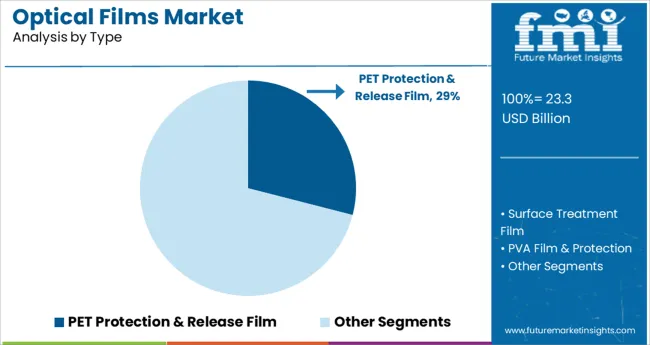
PET protection & release film is expected to capture 29.0% of the total market revenue in 2025, making it the leading segment by type. This segment’s dominance is being attributed to its superior durability, dimensional stability, and clarity, which are critical for safeguarding sensitive display surfaces during manufacturing, transportation, and final use.
PET’s resistance to heat and moisture enhances product lifecycle and reduces rework in high-throughput display assembly lines. Its compatibility with anti-scratch coatings and clean-peel adhesives has made it a preferred choice for protecting high-value screens.
In addition, its reusability and recyclability support sustainable production goals, aligning with broader environmental mandates in the consumer electronics sector.
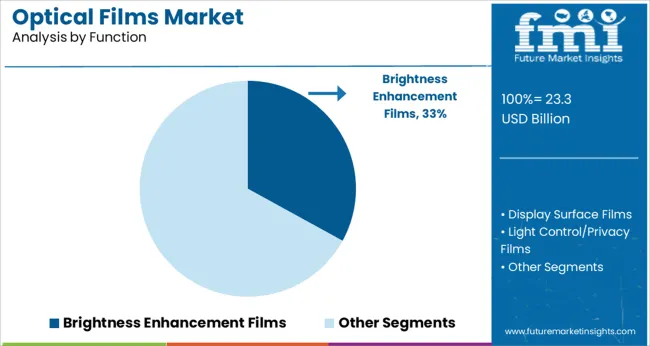
Brightness enhancement films (BEFs) are projected to account for 33.0% of the market share by 2025, positioning them as the leading functional category. This leadership is driven by their ability to significantly improve screen visibility and reduce power consumption in electronic devices by enhancing backlight efficiency.
BEFs increase luminance without requiring additional energy input, making them highly valued in battery-powered devices such as smartphones, tablets, and laptops. As display manufacturers prioritize thinner, brighter panels with lower energy footprints, BEFs have gained traction across mainstream and premium segments.
Continuous innovations in prismatic film designs and multilayer configurations are expected to further support their role in next-generation display architectures.
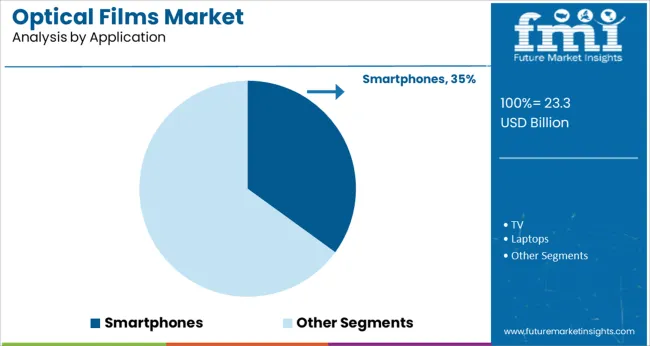
Smartphones are forecast to contribute 35.0% of the overall market revenue in 2025, making them the leading application area for optical films. The segment’s strength is supported by the global proliferation of mobile devices, demand for high-resolution displays, and the push for compact, durable screens with enhanced visual performance.
Optical films used in smartphones support multiple functions including anti-glare, brightness enhancement, scratch protection, and color correction, thereby playing a vital role in display quality and device longevity. Manufacturers are increasingly integrating advanced film technologies to meet expectations for battery efficiency, edge-to-edge display clarity, and outdoor visibility.
The growing shift toward foldable and flexible smartphones further amplifies the importance of robust and adaptable optical films tailored to next-generation form factors.
Different products of optical thin film help in different sectors of the market. The vendor brands try to target every sector and their expertise.
From adjusting the light intensity to allowing only selected wavelengths to pass, optical films help in changing optical paths and separating light components. These diverse applications, along with technological advancements, help the market and set it up for a better future.
Dichroic Mirrors/Dichroic Filters:
The multiplayer dielectric films are formed with different refractive rates that can separate light in an arbitrary specific wavelength range. It transforms it into light and reflects light using light interference.
It is also applied in fluorescence analysis, spectrometers, and lightning. These procedures are followed for astronomical observations. Agencies such as NASA and ISRO are the major end
Antireflection Coating (AR coating):
By creating a single-layer or multi-layer dielectric film on the surface of an optical material, the antireflection coating can prevent the reflection of light on the surface and improve the transmittance. Holding a wide range of applications, these films are formed on camera lenses, end faces of optical fibers for communications, laser resonance crystals, etc., and users of it.
Beam Splitters:
The optical film is also used as the beam splitter, where it splits light into two beams by reflectance and transmittance. The process depends upon the polarization component and intensity of light. Majorly used for optical pickups and optical communication, beam splitter has two different types: prism type and flat plate type.
The ability to control the amount of light reaching the eyes when viewing LED screen devices increases the adoption of optical films. The demand for optical films rises owing to privacy provided by limiting visibility to users only.
Revenue of USD 19,015.6 Million by the polarising film sub-segment is expected to be garnered, experiencing the highest growth during the forecast period, therefore, expecting the optical films market growth.
Increasing demand for well-structured b and brighter display panels is expected to accelerate the sales of optical films. Strategic affiliations amongst the key players are a key strategy for the expansion of the global optical films market share.
The use of optical films in various devices, such as desktop monitors, laptops, smartphones, tablets, television, etc., is increasing the demand for optical films.
Technological advancements owing to the increasing use of devices using applications such as LCDs and LEDs surged the adoption of optical films.
Increasing infiltration of the Internet of Things (IoT) but industries, government institutes, academic institutes, offices, etc. are growing the demand for optical films.
Increasing demand for larger LCD television units of varying sizes amongst the end users supports the global optical films market growth.
Rapidly increasing screen size of LCD and OLED displays of televisions drives the sales of optical films.
The optical film market size expands owing to its correlation with the consumer electronics market.
Emerging markets witnessing a rising trend of digitization propels the adoption of optical films.
Large infrastructure projects such as smart cities, along with intelligent transportation receiving huge investments, are fuelling the sales of optical films.
Growing smartphone adoption in developing countries is boosting the global optical film market size.
Increasing consumer demand for smart electronic wearables further increases demand for optical films.
Constant upgradation in technology bolsters the global optical films market growth.
The high durability against bending and curving surges demand for optical films.
Sales of optical films increase additionally owing to their heat and moisture resistance.
Advertisement panels, hoarding screens, and optical display applications require the adoption of optical films.
The rising usage of optical films by small and medium-scale enterprises in developing economies increases the demand for optical films.
The diversity in types of optical films available in the market, depending on thickness, refractive index, and material, further expands the optical films' market share.
The surging number of end-user industries in developing economies further drives the sales of optical films.
Advancement in display technologies publishes alternatives like Active Matrix Organic Light Emitting Diode (AMOLED) displays, hampering the demand for optical films.
Significant competition amongst key players can hinder the optical film market share.
The high manufacturing cost curbs the sales of optical films among consumers.
The high cost associated with the production of raw materials further obstructs the global optical films market growth.
Research and development proficiencies requiring huge investments impede the demand for optical films.
The pandemic caused a shortage of contractors, and the termination of contracts severely thwarted the global optical film market size.
The supply chain breaking due to strict lockdown restrictions further restrained the adoption of optical films.
Manufacturers are aiming to launch innovative and cost-efficient products via extensively investing in research and development, which promises growth of the optical films market size.
Collaborating with consumer electronic product manufacturers or OEMs to develop consumer-centric products increases demand for optical films.
The espousal of electric vehicles for transport and e-learning in schools and educational institutes bolsters the sales of optical films.
An increase in disposable income amongst the middle-class population surges demand for optical films.
Penetration of online shopping of electric devices, along with festive discounts, expands the optical films market share.
Growing awareness about eye health surges the growing demand for optically coated glasses, further increasing the demand for optical films.
The growing popularity of flexible and foldable displays used in smartphones, tablets, and other electronic devices accelerates the adoption of optical films.
The Asia Pacific optical film market growth is dominating the global market with an approximate share of 30.2% in 2025.
This is owing to the rapid growth of end-use industries like consumer electronics, automotive, industrial, optical equipment, and lighting.
An increasing number of optical film manufacturers, especially in the countries of China, Japan, and South Korea in this region, further boosts the global optical films market growth.
Demand for advanced optical films in various electrical devices further propels the optical films market size.
The disposable income of the middle-class population of this region contributes to market growth as well.
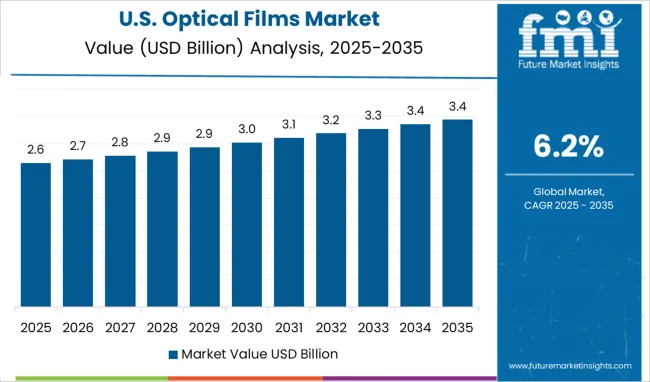
North America comes second in dominating the optical films market share with a CAGR of 30%.
Increasing economic expansion, technological advancement, and consumers preferring advanced features on devices promise growth in the optical films market size.
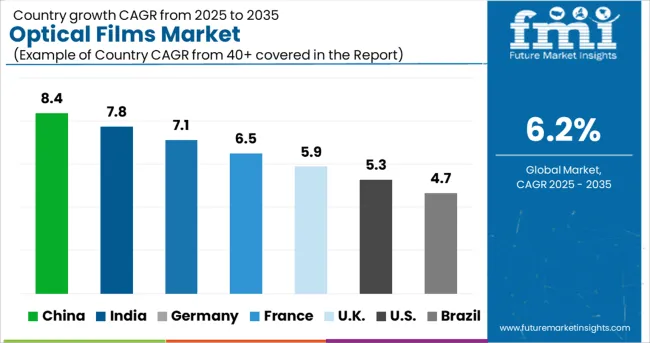
Europe is a growing optical films market and is expected to hold a share of 25%, during the forecast period.
Factors contributing to market growth include technological advancements, consumer demand for new innovations in device features, along with globalization.
Manufacturers are continuously churning out new and intriguing innovations for electronic devices which are becoming possible owing to the advent of new technologies.
Consumers demanding gripping features for their smart devices fuels the inspiration behind the up-and-coming innovations.
Certain start-up companies in the optical films market share are Molecular Vista, BlueDot Photonics, QD Solar, Metamaterial, VUV Analytics, etc.
These companies are planning various strategies such as developing quantum dot-based solar material for flexible surfaces to generate energy, producing gas chromatography detectors that provide insights, and developing of a wide array of metamaterial applications in aerospace, medical, consumer electronics, etc.
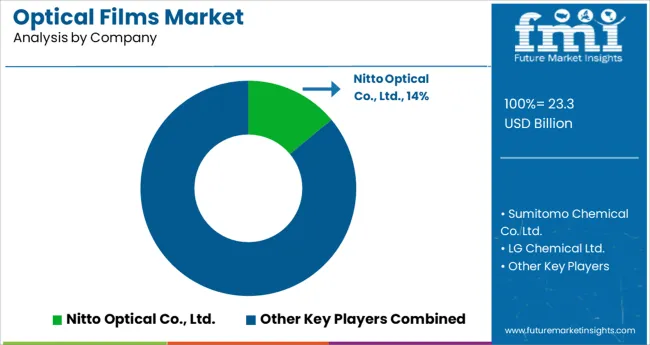
Some of the key participants of the optical films market are Nitto Optical Co., Ltd., Sumitomo Chemical Co. Ltd., LG Chemical Ltd., Samsung SDI (Formerly Cheil Industries), BenQ Materials Corp., Sanritz Co., Ltd., Zeon Corporation, 3M Company, American Polarizers, Inc., Toray Industries, Inc., Toyobo Co. Ltd., China Lucky Film Group Corporation, Teijin Limited, Mitsubishi Polyester Film GmbH, SKC Inc., Kolon Industries, Inc., Dexerials Corporation, Suntechopt Corporation, JXTG Nippon Oil & Energy Corporation, Hyosung Corporation, Fusion Optix Inc., Dejima Optical Films BV, KOLON Industries, Inc., Reynard Corporation (Optical Coatings), Nanpao Resins Chemical Group (Optical Film Adhesives), Touch International, Inc., Carestream Contract Manufacturing, Chimei Materials Technology Corp., Molecular Vista, BlueDot Photonics, QD Solar, Metamaterial, VUV Analytics, etc.
These players increasingly focus on product launches, technological advancements, and strategic collaborations to secure a competitive standpoint in the market. The growing use of smart devices, as well as the surge of social media, contributes to inspiration for new innovations in the optical films market growth.
Manufacturers are now keeping the importance of eye health in mind, along with prolonged screen time causing illnesses or discomforts such as dark circles, headaches, insomnia, etc., and developing products using innovative versions of optical films, accordingly.
Some of the recent developments in the optical films market are:
| Report Attribute | Details |
|---|---|
| Growth Rate | CAGR of 6.2% from 2025 to 2035 |
| The base year for estimation | 2024 |
| Historical data | 2020 to 2024 |
| Forecast period | 2025 to 2035 |
| Quantitative units | Revenue in million and CAGR from 2025 to 2035 |
| Report Coverage | Revenue forecast, volume forecast, company ranking, competitive landscape, growth factors, and trends, Pricing Analysis |
| Segments Covered | Type, Function, Application, and Region |
| Regional scope | North America; Western Europe; Eastern Europe; Middle East; Africa; ASEAN; South Asia; Rest of Asia; Australia; and New Zealand |
| Country scope | USA, Canada, Mexico, Germany, United Kingdom, France, Italy, Spain, Russia, Belgium, Poland, Czech Republic, China, India, Japan, Australia, Brazil, Argentina, Colombia, Saudi Arabia, United Arab Emirates, Iran, South Africa |
| Key companies profiled | Nitto Optical Co.; Ltd.; Sumitomo Chemical Co. Ltd.; LG Chemical Ltd.; Samsung SDI (Formerly Cheil Industries); BenQ Materials Corp.; Sanritz Co.; Ltd.; Zeon Corporation; 3M Company; American Polarizers; Inc.; Toray Industries; Inc.; Toyobo Co. Ltd.; China Lucky Film Group Corporation; Teijin Limited; Mitsubishi Polyester Film GmbH; SKC Inc.; Kolon Industries; Inc.; Dexerials Corporation; Suntechopt Corporation; JXTG Nippon Oil & Energy Corporation; Hyosung Corporation; Fusion Optix Inc.; Dejima Optical Films BV; KOLON Industries; Inc.; Reynard Corporation (Optical Coatings); Nanpao Resins Chemical Group (Optical Film Adhesives); Touch International; Inc.; Carestream Contract Manufacturing; Chimei Materials Technology Corp.; Molecular Vista; BlueDot Photonics; QD Solar; Metamaterial; VUV Analytics; etc. |
| Customization scope | Free report customization (equivalent to up to 8 analysts' working days) with purchase. Addition or alteration to country, regional & segment scope. |
| Pricing and purchase options | Avail customized purchase options to meet your exact research needs. |
The global optical films market is estimated to be valued at USD 23.3 billion in 2025.
It is projected to reach USD 42.5 billion by 2035.
The market is expected to grow at a 6.2% CAGR between 2025 and 2035.
The key product types are pet protection & release film, surface treatment film, pva film & protection, reflector film and light guide plate.
brightness enhancement films segment is expected to dominate with a 33.0% industry share in 2025.






Our Research Products

The "Full Research Suite" delivers actionable market intel, deep dives on markets or technologies, so clients act faster, cut risk, and unlock growth.

The Leaderboard benchmarks and ranks top vendors, classifying them as Established Leaders, Leading Challengers, or Disruptors & Challengers.

Locates where complements amplify value and substitutes erode it, forecasting net impact by horizon

We deliver granular, decision-grade intel: market sizing, 5-year forecasts, pricing, adoption, usage, revenue, and operational KPIs—plus competitor tracking, regulation, and value chains—across 60 countries broadly.

Spot the shifts before they hit your P&L. We track inflection points, adoption curves, pricing moves, and ecosystem plays to show where demand is heading, why it is changing, and what to do next across high-growth markets and disruptive tech

Real-time reads of user behavior. We track shifting priorities, perceptions of today’s and next-gen services, and provider experience, then pace how fast tech moves from trial to adoption, blending buyer, consumer, and channel inputs with social signals (#WhySwitch, #UX).

Partner with our analyst team to build a custom report designed around your business priorities. From analysing market trends to assessing competitors or crafting bespoke datasets, we tailor insights to your needs.
Supplier Intelligence
Discovery & Profiling
Capacity & Footprint
Performance & Risk
Compliance & Governance
Commercial Readiness
Who Supplies Whom
Scorecards & Shortlists
Playbooks & Docs
Category Intelligence
Definition & Scope
Demand & Use Cases
Cost Drivers
Market Structure
Supply Chain Map
Trade & Policy
Operating Norms
Deliverables
Buyer Intelligence
Account Basics
Spend & Scope
Procurement Model
Vendor Requirements
Terms & Policies
Entry Strategy
Pain Points & Triggers
Outputs
Pricing Analysis
Benchmarks
Trends
Should-Cost
Indexation
Landed Cost
Commercial Terms
Deliverables
Brand Analysis
Positioning & Value Prop
Share & Presence
Customer Evidence
Go-to-Market
Digital & Reputation
Compliance & Trust
KPIs & Gaps
Outputs
Full Research Suite comprises of:
Market outlook & trends analysis
Interviews & case studies
Strategic recommendations
Vendor profiles & capabilities analysis
5-year forecasts
8 regions and 60+ country-level data splits
Market segment data splits
12 months of continuous data updates
DELIVERED AS:
PDF EXCEL ONLINE
Optical Connector Polishing Films Market Size and Share Forecast Outlook 2025 to 2035
Optical Fiber Cold Joint Market Size and Share Forecast Outlook 2025 to 2035
Optical Spectrum Analyzer Market Size and Share Forecast Outlook 2025 to 2035
Optical Extinction Analyzer Market Size and Share Forecast Outlook 2025 to 2035
Optical Character Recognition Market Forecast and Outlook 2025 to 2035
Optical Satellite Market Size and Share Forecast Outlook 2025 to 2035
Optical Imaging Market Size and Share Forecast Outlook 2025 to 2035
Optical Whitening Agents Market Size and Share Forecast Outlook 2025 to 2035
Optical Fingerprint Collector Market Size and Share Forecast Outlook 2025 to 2035
Optical Lens Materials Market Size and Share Forecast Outlook 2025 to 2035
Optical Microscope Market Size and Share Forecast Outlook 2025 to 2035
Optical Component Tester Market Size and Share Forecast Outlook 2025 to 2035
Optical EMI Shielding Adapters Market Size and Share Forecast Outlook 2025 to 2035
Optical Transmitter Market Size and Share Forecast Outlook 2025 to 2035
Optical Telephoto Lens Market Size and Share Forecast Outlook 2025 to 2035
Optical Lattice Clock Market Size and Share Forecast Outlook 2025 to 2035
Optical Grade Lithium Tantalate Wafers Market Size and Share Forecast Outlook 2025 to 2035
Optical Grade LiTaO3 Crystal Substrate Market Size and Share Forecast Outlook 2025 to 2035
Optical Brighteners Market Size and Share Forecast Outlook 2025 to 2035
Optical Liquid Level Sensor Market Size and Share Forecast Outlook 2025 to 2035

Thank you!
You will receive an email from our Business Development Manager. Please be sure to check your SPAM/JUNK folder too.
Chat With
MaRIA